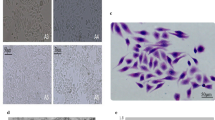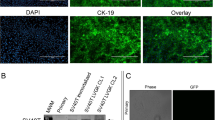Abstract
Primary human panceratic exocrine adenocarcinoma has been established in tissue culture and as xenografts in immune-deficient nu/nu mice. The cell line has a doubling time of 36 h and grows as a confluent monolayer together with a constant population of free-floating cells. Evidence of tumourigenicity was provided by growth on an early diploid fibroblast monolayer and in soft agar, and as solid tumours in immune-deficient nu/mu mice. Chromosome analysis of the cultured cells confirmed their tumour origin. Xenografts established from the cell line or directly from primary tumour tissue have retained a similar histology to the original tumour on serial transplantation. An electrophoretic study of exportable pancreatic digestive enzymes and a number of intracellular enzymes has shown that the cell line and xenografts maintain a human intracellular enzyme profile, but do not produce pancreatic digestive enzymes.
Similar content being viewed by others
Rights and permissions
About this article
Cite this article
Grant, A., Duke, D. & Hermon-Taylor, J. Establishment and characterization of primary human pancreatic carcinoma in continuous cell culture and in nude mice. Br J Cancer 39, 143–151 (1979). https://doi.org/10.1038/bjc.1979.24
Issue Date:
DOI: https://doi.org/10.1038/bjc.1979.24
- Springer Nature Limited
This article is cited by
-
Establishment of a human pancreatic adenocarcinoma cell line (JF305) with p53 expression
Chinese Journal of Cancer Research (1995)
-
Characterization of three cloned cell lines from aN-nitrosobis(2-hydroxypropyl)amine-induced transplantable hamster pancreatic ductal adenocarcinoma
International journal of pancreatology (1994)
-
Structural analysis of a new highly metastatic cell line PaTu 8902 from a primary human pancreatic adenocarcinoma
Virchows Archiv B Cell Pathology Including Molecular Pathology (1993)
-
A new human pancreatic carcinoma cell line developed for adoptive immunotherapy studies with lymphokine-activated killer cells in nude mice
In Vitro Cellular & Developmental Biology (1988)
-
Considerations in the use of nude mice for cancer research
Cancer and Metastasis Review (1984)




